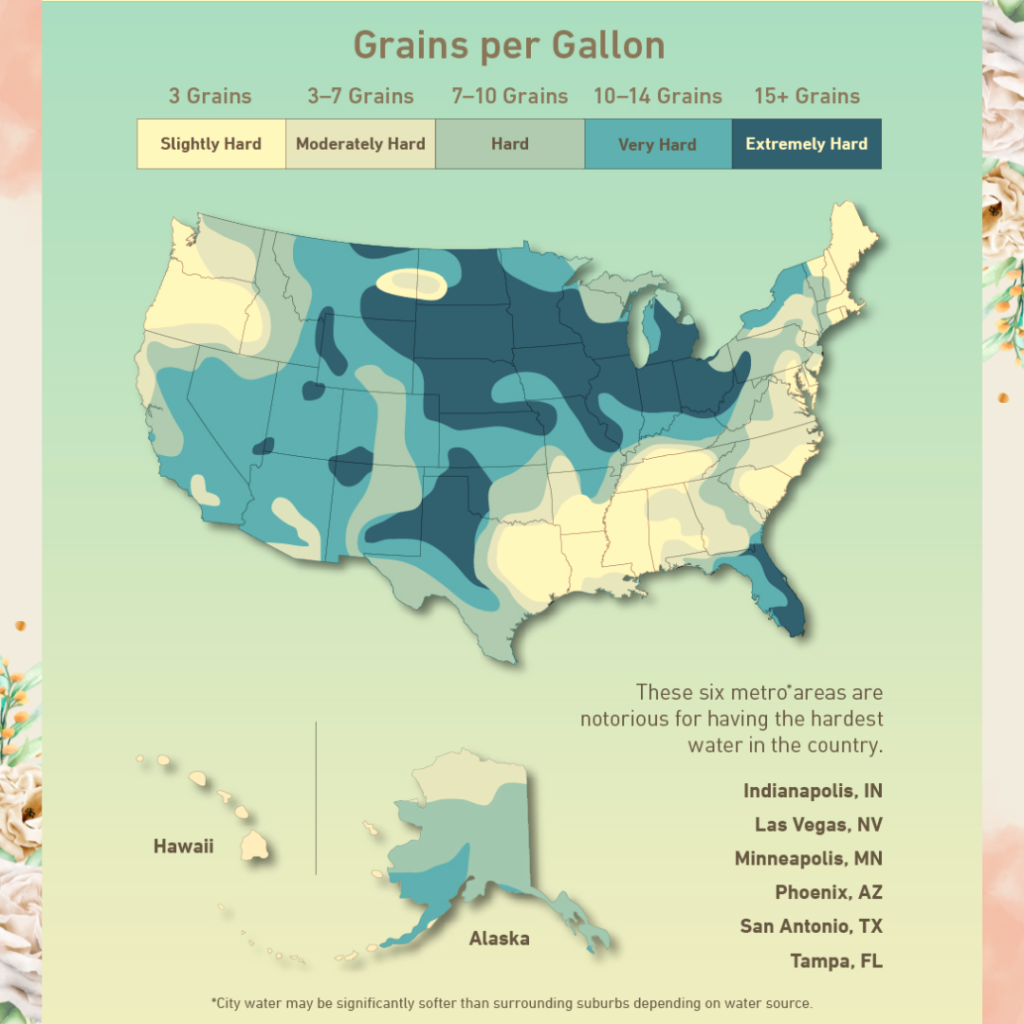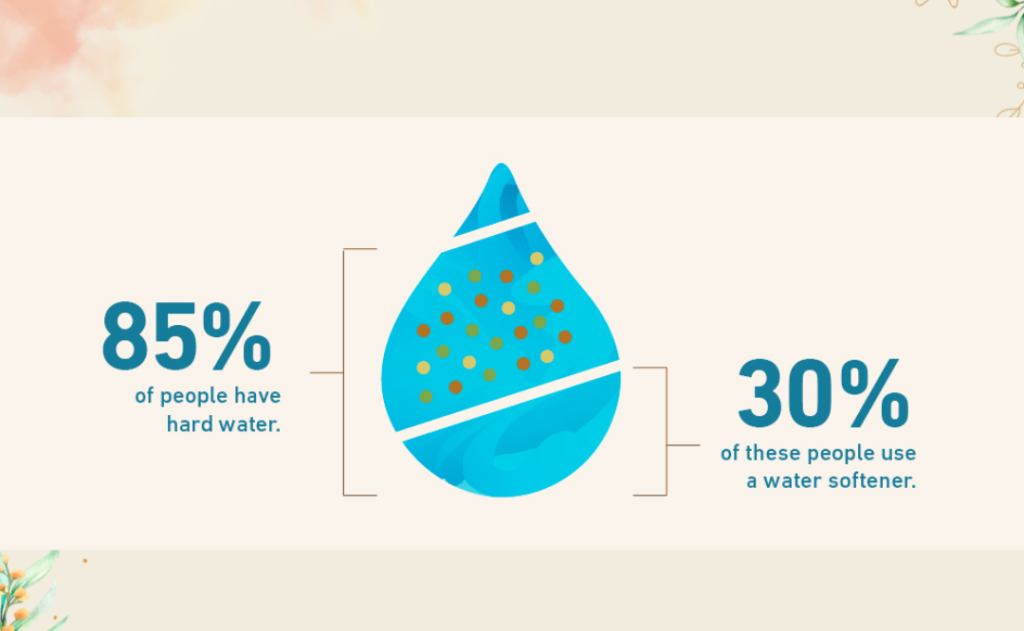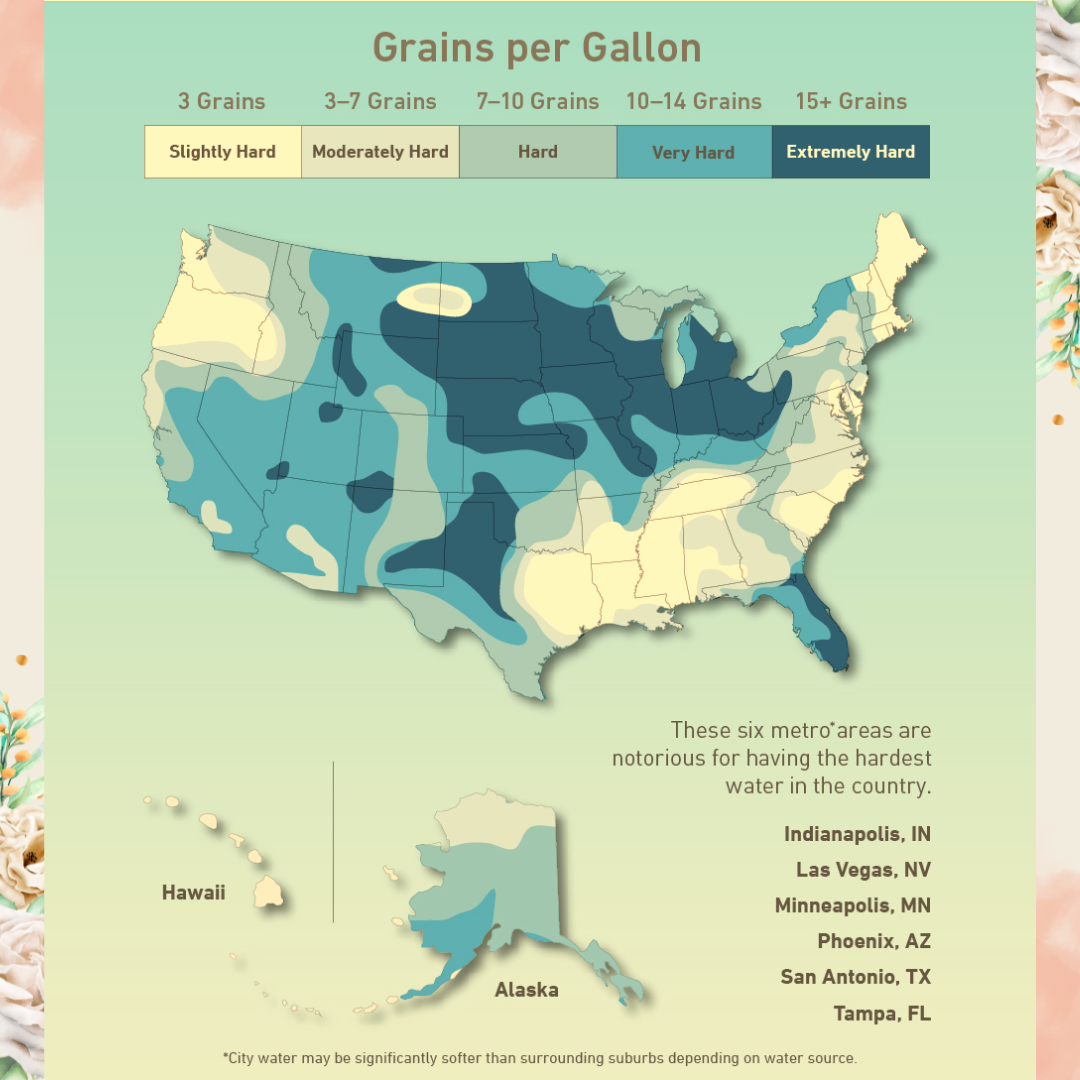Hard water is a common issue in many households across the United States. In fact, approximately 85% of the U.S. is affected by hard water, meaning the majority of Americans experience its effects. Whether you live in a bustling city or a quiet suburban neighborhood, the chances are high that your water supply contains significant levels of minerals such as calcium and magnesium. In this article, we’ll take a closer look at hard water across the U.S., explore the cities most impacted by it, and discuss the implications of living with hard water.
What Is Hard Water?
Hard water is water that contains high levels of dissolved minerals, primarily calcium and magnesium. These minerals are picked up as water flows through rocks and soil, and they accumulate over time. While hard water is not harmful to your health, it can have several undesirable effects on your home and daily life.
Common signs of hard water include:
- Soap scum buildup: Soap doesn’t dissolve well in hard water, leaving behind a chalky residue on your dishes, skin, and bathroom fixtures.
- Scale deposits: Hard water causes mineral buildup on faucets, showerheads, and pipes, which can lead to reduced water flow and efficiency.
- Dry skin and hair: The minerals in hard water can strip natural oils from your skin and hair, leaving them feeling dry and irritated.
- Clogged appliances: Water heaters, dishwashers, and washing machines can accumulate scale over time, leading to decreased efficiency and potentially expensive repairs.
Hard Water Across the United States
While hard water is a widespread issue, its severity varies from region to region. Some areas experience mild hard water, while others have water that is classified as “extremely hard.” Factors such as local geology, water sources, and the region’s water infrastructure contribute to these differences.
The U.S. Geological Survey (USGS) has created a hard water map that classifies the hardness of water in different parts of the country. This map uses a scale from soft to extremely hard, with the majority of the U.S. falling into the “moderately hard” to “hard” categories.
Top Cities with Hard Water / Hard Water Across the US – Hard Water Map

Some cities are known for having particularly high levels of water hardness. Here are a few examples of major cities in the U.S. where residents are most likely to encounter hard water issues:
1. Indianapolis, IN
Indianapolis is one of the cities with the hardest water in the United States. The area’s water comes from deep groundwater sources, which are rich in minerals like calcium and magnesium. Residents often report problems with soap scum buildup and scale deposits on appliances, making water softening solutions particularly popular in the region.
2. Las Vegas, NV
Las Vegas is located in a desert region, where groundwater is naturally high in mineral content. The water in Las Vegas is classified as “hard” to “very hard,” which can lead to significant issues with mineral buildup in appliances, especially water heaters and washing machines. Many residents invest in water softeners to help mitigate the negative effects of hard water.
3. Minneapolis, MN
Minneapolis is another city where hard water is a common problem. The area’s water comes from lakes, rivers, and deep wells, all of which contain varying amounts of calcium and magnesium. The hardness levels in Minneapolis range from moderate to hard, and residents often find themselves using cleaning products specifically designed to address mineral deposits.
4. Phoenix, AZ
Phoenix, like many cities in the southwestern U.S., faces challenges related to water hardness. The region’s naturally high levels of calcium and magnesium can cause problems for residents, especially when it comes to scale buildup in plumbing and appliances. In addition, the arid climate further exacerbates water hardness issues, leading to a higher demand for water softening solutions.
5. San Antonio, TX
San Antonio, Texas, is known for its extremely hard water. The city’s water supply comes from underground aquifers that contain high concentrations of calcium and magnesium. This results in significant mineral buildup in pipes, fixtures, and appliances, which can lead to decreased efficiency and even premature appliance failure. Many residents in San Antonio rely on water softeners to combat the effects of hard water.
6. Tampa, FL
Tampa, located on the Gulf Coast of Florida, experiences hard water due to the limestone bedrock that underlies much of the region. The area’s water is considered moderately hard to hard, and this can result in problems like soap scum and scale buildup in bathrooms and kitchens. Tampa residents often use water softening systems to reduce the impact of hard water on their homes.
The Geology Behind Hard Water
Did you know that the region’s geology plays a significant role in determining water hardness? Most of the United States was once covered by ancient seabeds, which left behind large concentrations of limestone and other mineral-rich rocks. As water moves through these rocks, it dissolves minerals like calcium and magnesium, resulting in the hard water that many regions face today.
In areas with limestone-rich geology, water tends to have a higher mineral content. This is why regions with large limestone deposits, such as parts of Texas, Arizona, and Florida, often experience extremely hard water. In contrast, areas with granite-based geology tend to have softer water, as granite contains fewer minerals that dissolve into the water.
The Impact of Hard Water on Homes and Appliances
While hard water itself is not harmful to your health, it can cause a range of problems in your home. Over time, the mineral buildup can damage appliances, pipes, and fixtures, leading to costly repairs and replacements. Here are some common issues caused by hard water:
- Clogged pipes and reduced water flow: Mineral deposits can accumulate inside pipes, reducing water flow and potentially causing clogs.
- Decreased appliance efficiency: Water heaters, dishwashers, and washing machines that operate with hard water often experience reduced efficiency. The minerals in hard water can coat heating elements and clog filters, causing appliances to work harder and use more energy.
- Staining and soap scum: Hard water can leave behind stubborn stains on sinks, tubs, and dishes, as well as soap scum on bathroom tiles and shower doors.
- Dry skin and hair: The minerals in hard water can strip natural oils from your skin and hair, leading to dryness, irritation, and other skin issues.
Solutions for Hard Water
If you live in an area with hard water, there are several solutions to help mitigate its effects:
- Water softeners: A water softener is the most effective way to reduce water hardness. These systems use an ion exchange process to remove calcium and magnesium from the water, replacing them with sodium ions.
- Descaling agents: For appliances like water heaters and dishwashers, descaling agents can help remove mineral buildup and improve efficiency.
- Water conditioners: Some water conditioners can alter the way minerals interact with water, reducing the formation of scale and soap scum.

Conclusion
Hard water is a widespread issue across the United States, affecting the majority of households. While the severity of the problem varies by region, cities like Indianapolis, Las Vegas, and San Antonio are particularly impacted by high levels of calcium and magnesium. Understanding the causes of hard water and the problems it can cause is the first step in addressing the issue. Fortunately, with the right water treatment solutions, homeowners can enjoy the benefits of soft water and protect their plumbing, appliances, and skin from the damaging effects of hard water.
If you’re experiencing issues with hard water in your home, consider consulting with a water treatment professional to find the best solution for your needs.

